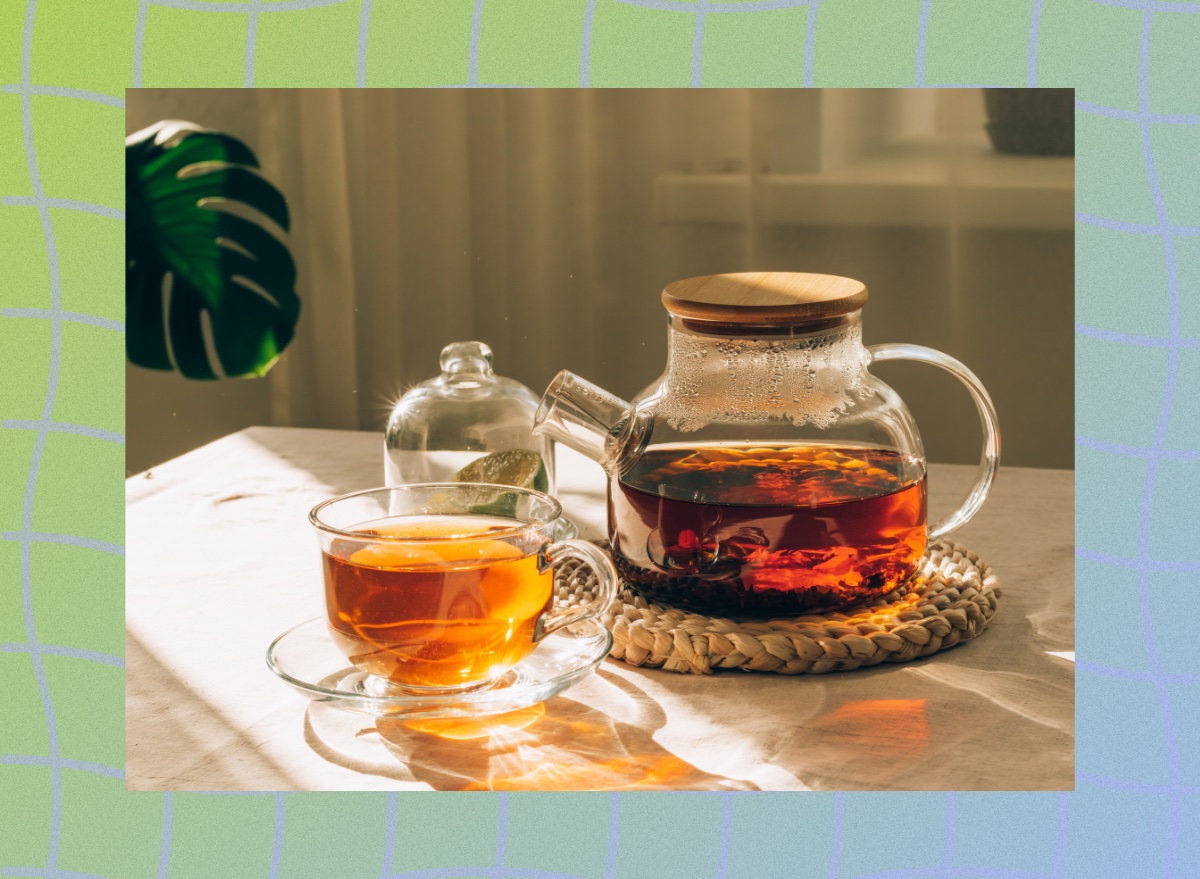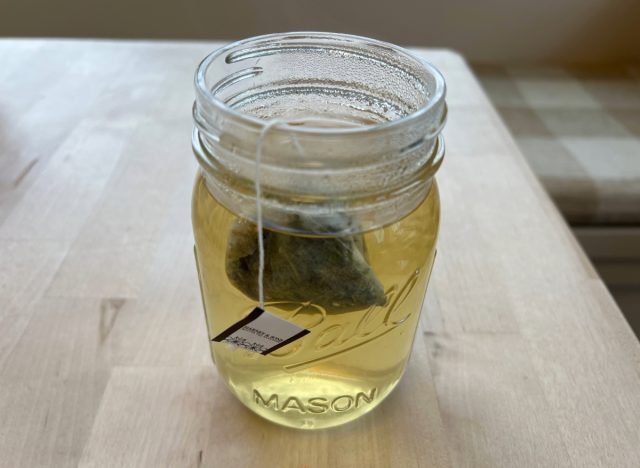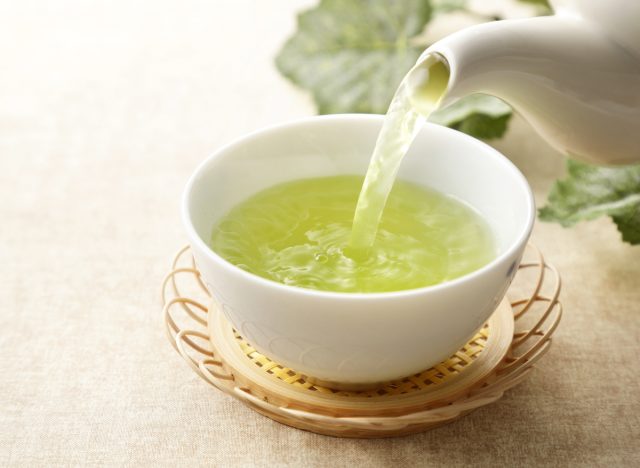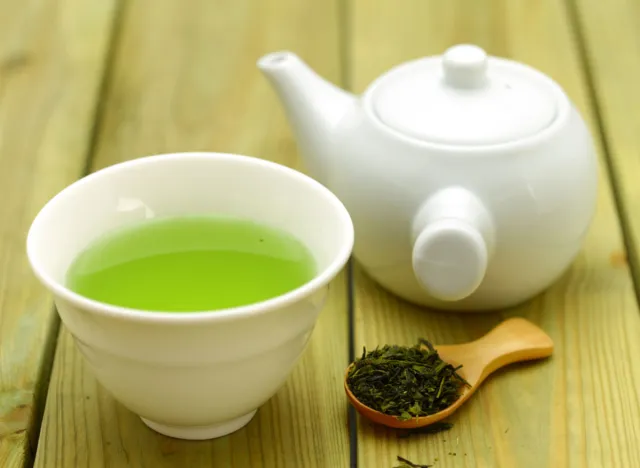I Drank Green Tea Instead of Coffee for 30 Days & Experienced 3 Life-Changing Benefits

There are coffee drinkers, there are tea drinkers, and then there are green tea drinkers… a category all its own. It's understandable why green tea is such a fun and distinct hot beverage option. The aroma offers soothing and relaxing qualities that exude "day at the spa" vibes, but you may still get a necessary caffeine boost to help you power through the morning. And that's not all! I drank green tea for 30 days and am here to tell you all about my journey. (I even pulled out my vintage tea cup and saucer to make this new daily ritual a little "extra.")
I consider myself to be a coffee/tea hybrid. I love a good latte, cappuccino, or hazelnut iced coffee just as much as the next person. When I opt for tea, I typically choose black tea or a matcha latte. I've never fully explored green tea as my main caffeine source—or go-to beverage—but recently did for 30 days straight. During my experiment, I enjoyed one cup of green tea in the morning and one in the early afternoon. (My caffeine cut-off is usually 1 or 2 p.m.)
Grab a cup, and keep reading to learn all about my 30 days of green tea.
I felt less anxious.

My normal morning cup of joe certainly wakes me up, but there's a price to pay. Coffee also makes me feel anxious, on edge, and jittery. When I switched to green tea, however, I found my mornings to be way less stressful and much more calming. It may be the combination of the aroma, the flavor, and the amount of caffeine in a cup of green tea that made this such a refreshing change.
The flip side to this newfound relaxed 30-day routine is that although I felt less anxious, I was not as energized during the day. This prompted me to determine just how much caffeine is in each beverage. According to the U.S. Food & Drug Administration, one eight-ounce cup of green tea contains around 30 to 50 milligrams of caffeine, compared to 80 to 100 milligrams in an eight-ounce cup of coffee. (No wonder I felt more relaxed and chill with green tea!)
To compensate for my lack of energy, halfway through my journey, I increased my consumption to three cups of green tea a day—two in the morning and one in the early afternoon—to ensure I was getting enough of the caffeine boost I needed. I think it did the trick!
The caffeine in green tea can certainly be enough to help people power through the day—it all comes down to how many cups your body needs to feel and function at its absolute best.
"Green tea contains caffeine, a natural stimulant that can temporarily boost metabolic rate," explains Amy Goodson, MS, RD, CSSD, LD, a registered dietitian and certified specialist in sports dietetics who sits on our Medical Expert Board. "Caffeine enhances the activity of the central nervous system and increases the release of neurotransmitters like dopamine and norepinephrine. This can lead to increased alertness and a higher metabolic rate, which means your body burns more calories."
Green tea helped me think better.

My new drink helped me think better and feel more focused on my daily tasks at hand. This was another exciting improvement compared to my coffee-drinking days when sometimes I experienced "brain fog" soon after finishing a cup of joe.
"The combination of caffeine and L-theanine, an amino acid found in green tea, may have positive effects on cognitive function," Goodson explains. "It can enhance alertness and improve mood without the jittery feeling often associated with high caffeine intake. Some research also suggests a potential protective effect against neurodegenerative diseases like Alzheimer's."
It calmed my stomach.

Plain and simple, I have a lot of stomach issues. Many foods and beverages disrupt my gut health, creating havoc. Even though I enjoy the taste of coffee, it has always been a trigger. Green tea, however, proved to be a calming beverage for my stomach and overall gut issues—and for good reason. (I always drink caffeine with food, as many caffeinated beverages can cause further issues on an empty stomach.)
I discovered that green tea is chock-full of polyphenols—especially catechins—which are "powerful antioxidants," according to Goodson. "Antioxidants help neutralize free radicals in the body (aka fight off the bad guys that contribute to inflammation), reducing oxidative stress and inflammation," she says. "This may contribute to the prevention of chronic diseases and aging." In fact, an inflamed gut can lead to many health issues, including nausea, constipation, and more.
Drinking green tea can also help with weight loss.

Losing weight was not a focus for me, but if it is for you, it's worth mentioning that green tea could aid in fat-loss efforts.
"Green tea has been studied for its potential role in weight loss and weight management. It contains caffeine and catechins, which can help boost metabolism and increase fat burning. Additionally, some studies suggest that green tea may aid in reducing abdominal fat," Goodson tells us. "Green tea catechins, particularly EGCG, have been shown to enhance fat oxidation. This means that the body may use fat as a source of energy more efficiently. This effect, coupled with increased metabolism, may contribute to weight loss or weight management over time."









